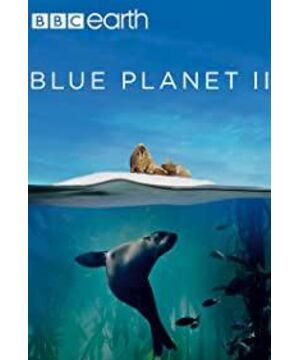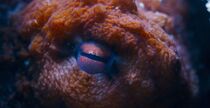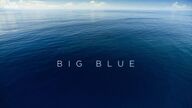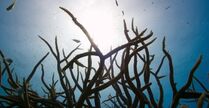one
In today's era, we can finally walk into nature on a microscopic level to understand magical species and lives other than us.
Ironically, this is not a fate, a causal cycle!
From ignorance and fear, to confrontation, awe, and superstition, from exploration and grabbing with curiosity and possessiveness, to ecological disasters and natural warnings prompted by excessive intervention and injury, to today's restoration, rescue and protection, Looking from a distance, getting close, and going in infinite depth... It's about to go back to the era of maintaining a safe distance or "human and god coexisting" again.
In this sense, science is far more disgusting and inferior than mystical primitive beliefs and worship. Maintaining the original mystical belief, at least sensing the "spirit of nature", invisibly preserving her systematicness, integrity, and self-containedness. Science, the self-righteous high-end behavior of human beings, to put it bluntly, is it the well-being of the entire life system and living environment? Or just for self-fulfillment! Not to mention the motivation behind it. The premise of creating and discovering new life, new species and new environment is to walk on the corpses of life, species and environment from generation to generation.
It seems to have taken a big step towards civilization, but it is just the fantasy and obscenity of human beings' own narrow cognition. Every step is just an attempt to discover the limit and potential of the self. Even if many individuals gather together, is it enough to obtain the truth? The "Saints" who have seen the truth have long been silent, or the frequency of their words has been blocked by the "Speakers".
Conquer it, hoping to catch up with the speed of future damage intensification and upgrading. Otherwise, from a macro perspective, it seems to be busy.
The material we perceive with our bodies and the life we see with our naked eyes have indeed become comfortable and beautiful. Naturally, it may not be so.
two
Walking into nature and approaching more living bodies has so much meaning! In addition to the viewing, entertainment, and entertainment in the mundane mind, understanding the world we live in, looking back at our lowliness and insignificance under creation, and the entanglement and tearing of human nature, in any case, is the meaning of entering other lives. It makes us wonder, wakes us up - is man the smartest animal? The toughest and most persistent animal? The most talented animal? The most paranormal animal? The most noble life form? ... We are best at the original only careful thought and unfulfilled desire.
While you have time, take a good look at the world we are in, the transparent green, deep blue, sunshine-like multicolored... Take a good look at the world we are in and the connection of all life. Large-scale changes and fading, not sensational resentments, not bizarre myths, when you are still immersed in the desire for sensual satisfaction, it is not far from you, and it happens simultaneously.
three
(1) Some data in "Blue Planet II"
Oceans cover 70% of Earth's surface (Episode 1)
The Mariana Trench is about 11 kilometers deep in the Pacific Ocean (Episode 2)
Mountains are not only on land, but there is a mountain range deep under the sea that spans the entire earth, the Mid Ocean Ridge (Episode 2)
More than three-quarters of volcanic activity occurs on the seafloor, with most concentrated on mid-ocean ridges. Minerals produced by volcanic activity are the basis of life. The number of organisms formed by hydrothermal vents is comparable to that of tropical rain forests (episode 2)
The Great Barrier Reefs is 2,300km long (Episode 3)
The most distant coral reef in the world is in the heart of the South Pacific in French Polynesia (Episode 3)
Most of the world's largest surfable waves form off the coast of Nazaré, Portugal (Episode 6)
Two-thirds of cities on Earth are coastal cities (episode 6)
Less than 1% of international waters are protected (Episode 7)
Arctic summer ice cover has been reduced by 40% (episode 1)
4,000-year-old coral faces extinction due to deep-sea fishing and global warming (Episode 2)
An average of 8 million tons of plastic are dumped into the sea each year (episode 4)
In the 1960s, the herring in the Norwegian waters of the Arctic Circle nearly went extinct due to overfishing (episode 7)
The clownfish, which can be called the "most talkative" under the sea, is also intruding on their communication methods due to factors such as seabed drilling and boating noise (episode 7)
It is estimated that in some sea areas there are half a million plastic items per square kilometer (episode 7)
2016 was the worst year for the Great Barrier Reef, with sea temperatures hitting record highs due to a combination of ocean warming and El Niño climate. Ninety percent of the coral around Lizard Island died. Alex Vail, who has been living by the seaside in Australia since he was a child, saw the "rock piles" formed by coral bleaching. He couldn't help crying under his diving mask (Episode 7)
The higher the carbon dioxide, the more acidic the sea water, which will break down the calcium carbonate in the reef. Therefore, some scientists predict that coral reefs are likely to die out by the end of this century (Episode 7)
Glaciers melt and sea levels rise. Cities like Miami could be affected, with sea levels rising by about a metre by the end of the century (Episode 7)
In 1992, several containers containing bath toys were lost in transit, containing 7,000 plastic ducks. Beginning in Alaska, the ducks embarked on a 1,600-kilometer journey. Some crossed the Pacific Ocean and reached Australia; some drifted north and landed between Alaska and Russia; some went to the North Pole... One of them drifted at sea for 15 years, crossing three oceans, and finally reached the west coast of Scotland (p. 4 set)
(2) Thinking, Calculating, Using Tools
"Using the brain" is not a patent of human beings. Every living being has an innate desire and instinct for survival. To this end, they also think, calculate, and use tools. Thinking about it carefully, in fact, everyone's life content is originally the same, in order to survive, monotonous and reciprocating; but because we can't keep this primitive mediocrity, we think that we must be superior to others, so we have a difference.
Alex watches the tusk fish slam the shellfish on the coral anvil (episode 1), sometimes taking hours to get a bite. Giant trevallies can accurately predict the flight height and speed of birds above the sea, and then jump up and bite them (episode 1). Clownfish are naturally immune to the toxins secreted by sea anemones, so this is an ideal haven for them, borrowing coconut shells and mineral water bottles to build nests and spawn in sea anemones (episode 3)...
Every life has its own way of thinking, provided it is in a natural environment.
(3) Survival instinct beyond imagination
One day, if the desire for survival and reproduction of human beings is pushed to the limit, will there be an incredible "regeneration"? In order to ensure the genetic advantage of offspring, fish and mollusks in the deep sea have evolved to an astonishing degree.
The kobudai in the northern sea of Japan (Episode 1) is often referred to as a "transformed fish". In order to have more mates, the larger female fish grows to a certain stage, and the body structure will undergo dramatic changes, and specific enzymes will suddenly It stops working, and male hormones start circulating in the body instead. In a few months, the forehead became larger, the jaw became wider, and it transformed into a "burly" male fish. The first thing is to find the male fish who had entangled her before "transformation", and establish a dominant position in this waters.
It sounds like "Eastern Invincible" in the deep sea.
Umbrella squid (episode 5) has a similar move, but it doesn't make such a big sacrifice, and a little trick can achieve the same effect. Naturally, the small male squid cannot compete with the heroic "big" squid for a partner, so it disguises itself according to the "beautiful" and figure of the female squid under the care of the "big"... Then, slowly The female squid who is under the protection of the male and has just completed a mating, steals her own mating opportunity under the eyes of the "big guy".
Banqin mantis shrimp will also decisively leave their partner of 20 years if they meet a larger widowed female mantis shrimp (episode 5).
Ingenuity seems to be a common problem in nature, but their purpose is simple and direct, not obscene.
Do the rulers wish that the people quickly evolved such a function to break the predicament of reproduction.
(4) Inspiration from nature
The tubular jellyfish lives almost forever, constantly cloning its own body. (Episode 2)
Sixgill sharks can last a year on a single meal. (Episode 2)
In the Pacific Islands, the blenny has become terrestrial because it can breathe through its skin. (Episode 6)
Humans, do we also have some kind of latent adaptation or ability, just that we haven't reached the evolutionary Jedi yet?
In other words, if each of us can focus 100% on the potential and inner functions of ourselves, instead of blindly seeking out, will we receive unexpected openings? Humanity has become the shackles of human beings.
After the sperm whale died, the sixgill shark ate it, followed by the spider crabs that came, and then the scavengers, even if they only ate the scraps, they were still on the verge of danger because the scabbardfish followed them. back. The sperm whale's bones will eventually completely dissolve in the ocean, and the zombie worms will suck up the fat and finally inject the acid. (Episode 2)
On the Pacific coast of North America, American cardinals work tirelessly every day to clean up sea urchins and other shellfish, but if it wasn't for sea otters to help "relieve", they would have fallen into an ecological crisis long ago. Sea otters were hunted frantically for a time, and as a result, sea urchins that feed on algae were rampant, and the green ecology of the seabed was destroyed. (Episode 5)
It turns out that in nature, there is no such thing as hunters and weak people, overlords or food. They are all allies in the same camp and do not need worldly means to understand and intervene. It is precisely because of the chasing and killing of green sea turtles by the ferret shark (Episode 5) that the ecological balance of seagrasses is maintained. It should be known that the amount of carbon dioxide absorbed by seagrasses in the same area is about 35 times that of tropical rain forests. Treating turtles as meek and loving them, and treating sharks as devils to drive them away are the most naive and stupid extravagant emotions that only humans can derive.
No matter how luxurious and humanized aquariums and aquariums are, it is impossible to create or simulate such a sophisticated and thoughtful ecosystem.
Get along with animals, but also see a fact: like humans, they also have to seize living space, food, and companions. Like Borneo green turtles (Episode 3), they will have disputes over territorial issues. Disputes seem to be the norm in the biological world, but what we are ashamed of is that the disputes in the animal kingdom are driven by instinct, a contest within the laws of nature, and our desires are a bottomless pit.
After the first full moon in winter, spider crabs will gather in groups of 100,000 just to break out of their shells. (Episode 5)
South Georgia Island is a paradise for emperor penguins every spring, partly for feeding offspring and partly for catastrophic moult, which replaces worn waterproof fur. (Episode 6)
The full moon and tides lead to the surging of seawater, which in turn affects the reproductive behavior and reproduction of fish. Therefore, all natural creatures should understand the principles of living, migrating, mating, and multiplying with the changes of the four seasons. This is like a biological cycle created by the Creator. Everything has a spirit, at least they sense it, but no humans follow it. Even if the ancients had a glimpse of the secrets of the sky, "Three generations or more, everyone knows about astronomy" (Gu Yanwu), and he paid special attention to "adapting to the season". "What about "don't eat after noon", "fire in July", and even give birth to "eight characters", but, after all, people are "higher animals", we have our own ideas, such as bending under the eaves all year round, and more. Not to mention the already chaotic and disorderly intercourse.
Leatherback turtles (olive ridley turtles) swim 1,500 kilometers just to reach their spawning grounds. (Episode 6)
The red rock crab on the tropical coast of Brazil has to take risks and jump over the defense line of the natural enemy moray eel just to eat a bite of seaweed. (Episode 6)
Human beings also have no chance of winning in terms of persistence and endurance. In order to complete their mission, these little beings will overcome all resistance and sacrifice their lives.
The death of the little dolphin on the east coast of the United States (episode 7), after autopsy and tests, the culprit, if no accident, is plastic pollution.
Plastics decompose into microplastics, and microplastics become food for microorganisms. Microbes follow the food chain and are absorbed and digested layer by layer by their superiors... I shudder to think about it. Where are we outside bystanders? We are not in this natural system and sit proudly at the top of the food chain!
(5) Naturally there are too many unknowns
Brine is also seen under the deep sea, which is a type of water five times saltier than seawater that gathers under the seabed to form a deep lake. (Episode 2) The most distinctive underwater "miracle" is the hydrothermal vent. Under extreme temperature and pressure, hydrocarbons (hydrocarbons) are being formed, which is the basic molecular composition of all living things, four billion. A few years ago, life may have been like this, and scientists thought it "may be the origin of life on Earth". (Episode 2)
It feels that people are getting closer to the "truth" mentioned in various classics, and it seems that they are about to unravel the topic of "who am I", which is related to eternal life.
Will this be our chance to return to balance? Or another untouchable "Pandora"?
View more about Blue Planet II reviews









